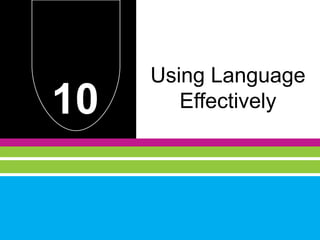
Chapter 10 Poetry 2012
- 1. Using Language 10 Effectively
- 2. Language The system of words people use to communicate with others He didn't have to wake up He'd been up all night Layin’ there in bed listenin’ To his new born baby cry He makes a pot of coffee He splashes water on his face His wife gives him a kiss and says It gonna be OK
- 3. Language Two roads diverged in a yellow wood, And sorry I could not travel both And be one traveler, long I stood And looked down one as far as I could To where it bent in the undergrowth; When I was young me and my mama had beef Seventeen years old kicked out on the streets Though back at the time, I never thought I'd see her face Ain't a woman alive that could take my mama's place Suspended from school; and scared to go home, I was a fool with the big boys, breakin all the rules
- 4. Language Basics Language is arbitrary—different meanings depending on the culture Language is ambiguous—words have multiple meanings Language is abstract— intangible Language is active—full of life
- 5. Spoken Versus Written Language Dynamic versus static Immediate versus distant Informal versus formal Narratives versus facts Rhythm versus image
- 6. Audience-Centered Language Put your language in context Personalize your language Use inclusive language Use visual language Spark imagination with your language
- 7. Guidelines for Using Language Use spoken language Choose meaningful words Balance clarity and ambiguity Be concise Avoid offensive and aggressive language